Meeting Times, Location, & Course Delivery Details
Contact Information
Upon Successful completion of this course...
Textbook: N/A
Upon completion of the course...
The learner will be able to:
B.1.3: Social Determinates of Health
Demonstrate knowledge of the social determinants of health for persons, groups, and populations with or at risk for disabilities and chronic health conditions and distinguishes the epidemiological factors that impact the public health and welfare of populations.
B.4 .1: Factors, Policy Issues, & Social Systems
Identify, analyze, and evaluate the influence of contextual factors and current federal, state, and local policy issues and structures on the delivery of occupational therapy services for persons, groups, or populations to promote and advocate for policy development and social systems as they relate to the practice of occupational therapy.
- Demonstrate an understanding of the unique healthcare issues facing individuals and families in rural contexts
- Understand the value of occupation-based programming that addresses the needs of rural communities
Tentative Schedule - Subject to change during the semester. Adequate notice of changes will be given.
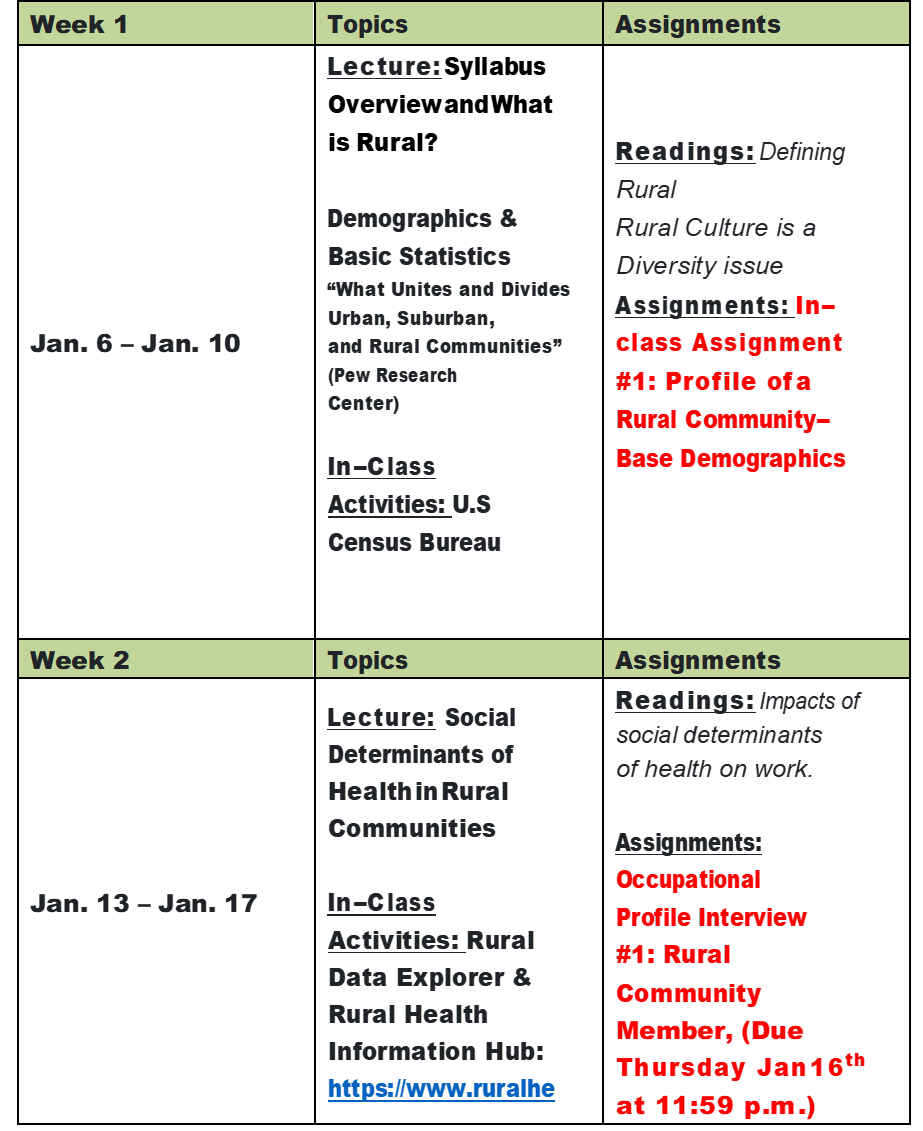
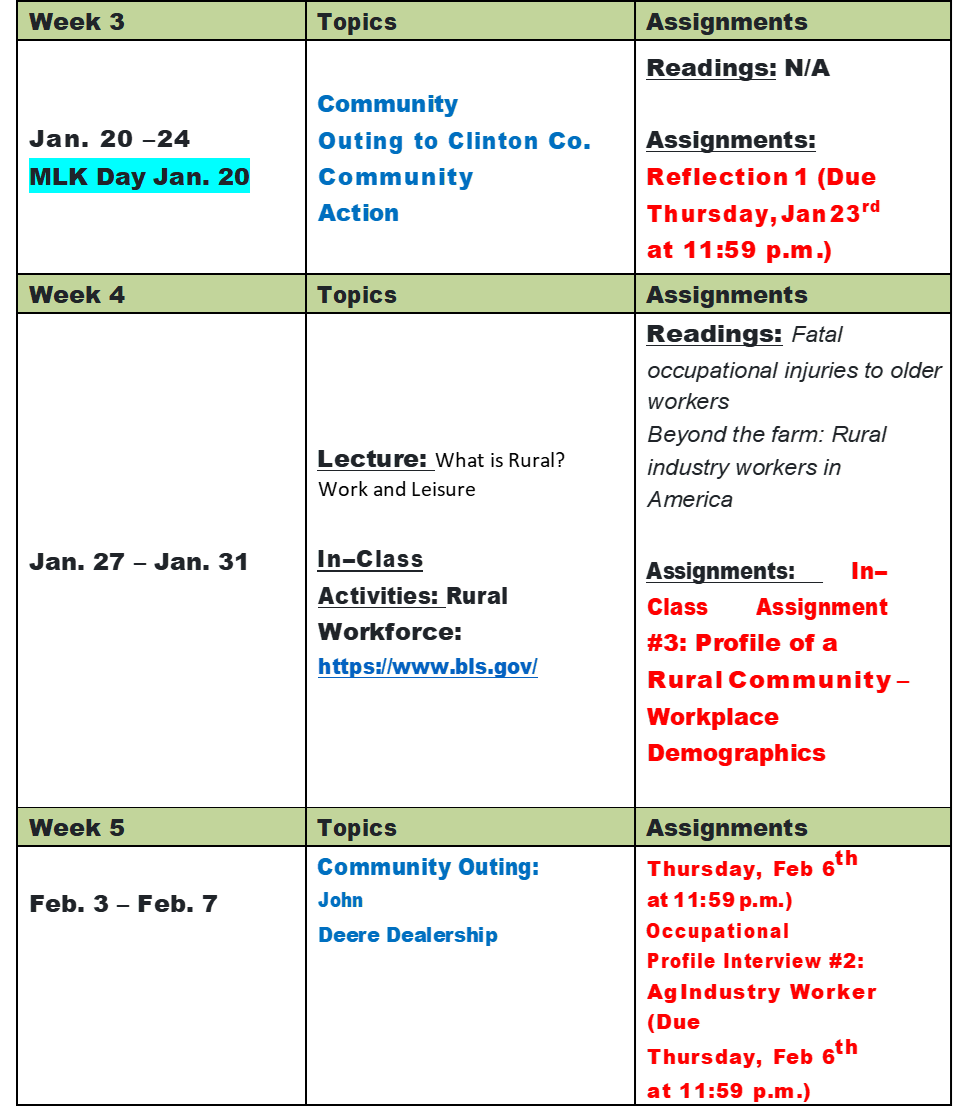
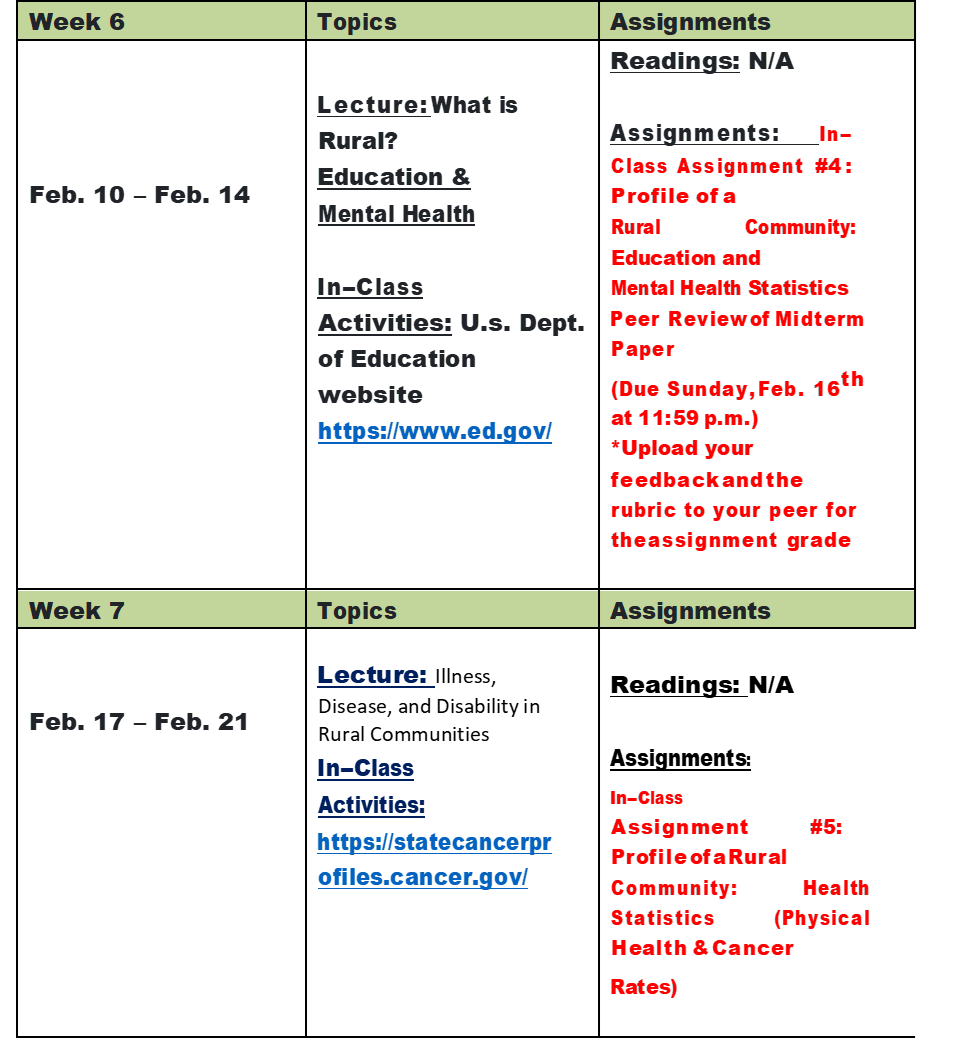
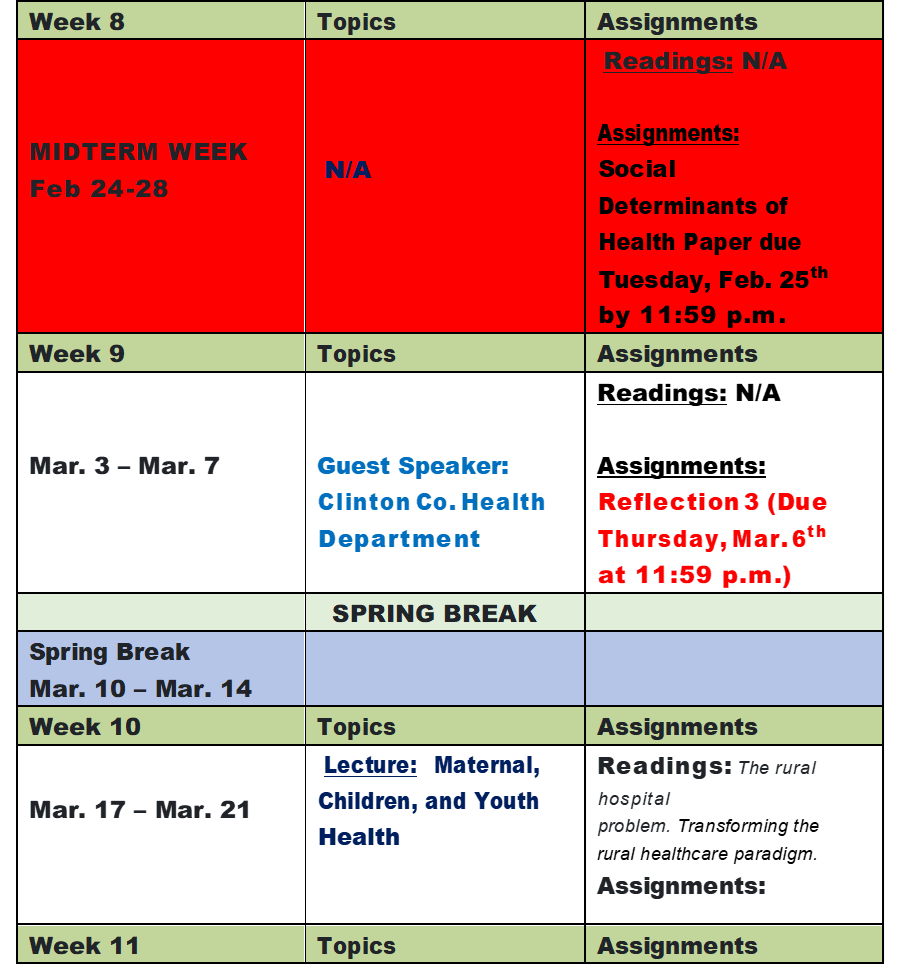
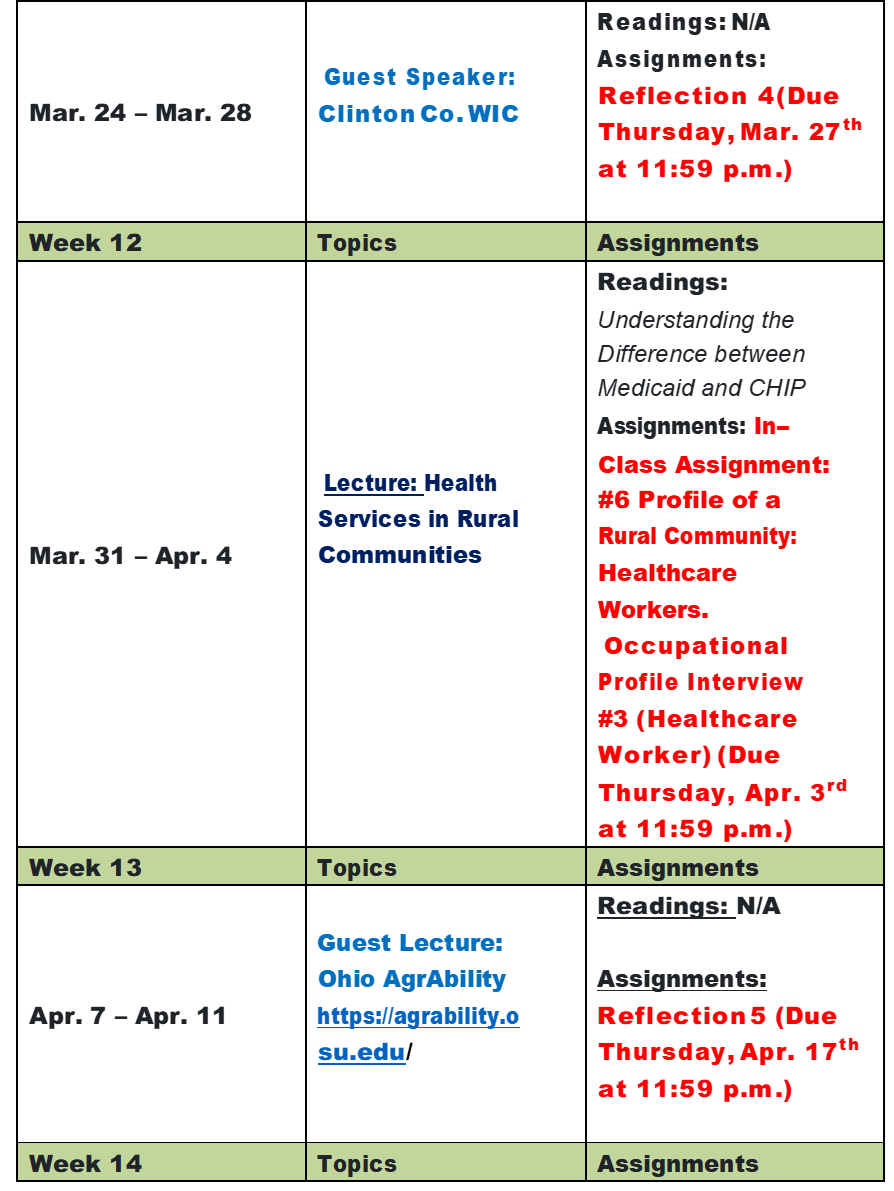
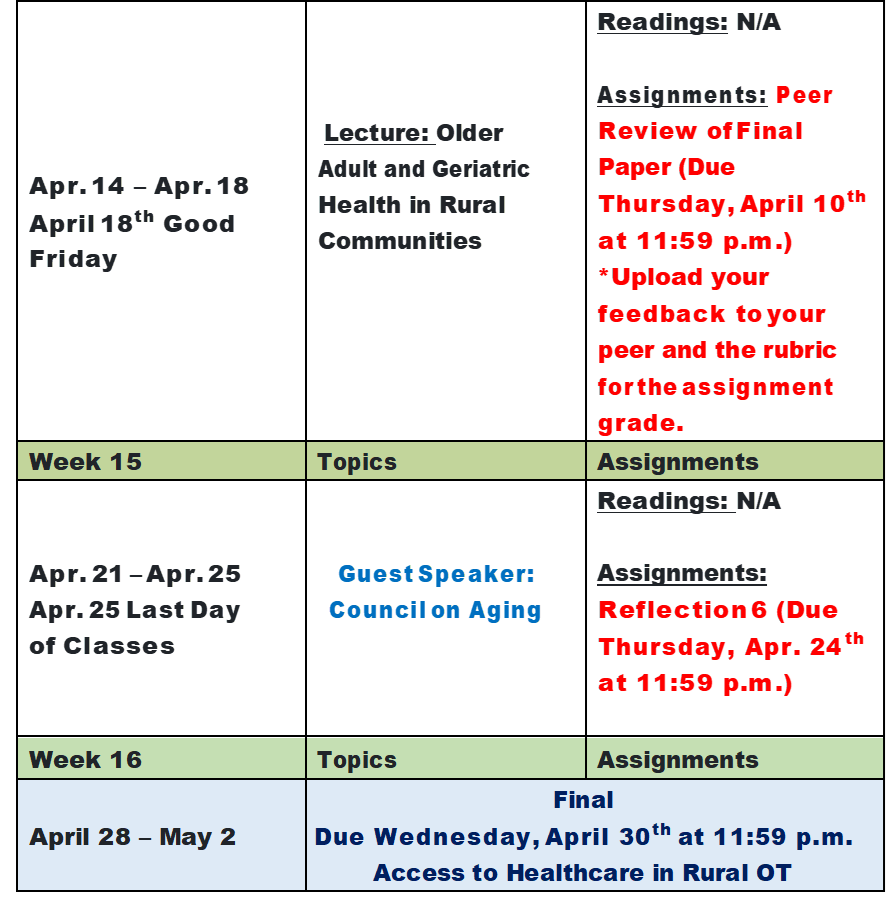
***Reasonable changes to the course schedule may be made by the faculty or instructor of record at any time during the semester***
The grading scale will be as follows:
Evaluation Methods | ||
| Assignment | Course Grade | Letter Grade Equivalents: |
| Occupational Profile Interviews | 30% | A = 90-100 |
| (x3) | B = 80-89 | |
| Reflections (x6) | 10% | F = 0-79 |
| Midterm: Social Determinants of | 25% | |
| Health Paper | 25% | |
| Final: Access to Rural HealthPaper | 10% | |
| In-class assignments (x6) | Complete/Incomplete | |
| Peer Reviews | 100% | Total % |
| Final: Access to Rural Health Paper | 25% | |
| In-class assignments (x5) | 10% | |
| Peer Reviews | Complete/Incomplete | |
| 100 | Total % | |
***Please note: A minimum of a “B” is required to pass a class in Occupational Therapy. If the student does not receive a minimum of a “B” in the course, he/she will have one opportunity to re-take the course and pass it when it is offered in the next year to continue to progress through the program. Two failures may result in dismissal.
Methods of Evaluation: Check all that apply
| Case Study | Presentation | X | |
| Exams | Demonstration | ||
| Group Projects | Individual Project | ||
| Assignments/Papers | X | Essay Test | |
| EBP Literature Analysis | Objective Test/Quiz | ||
| Lab Performance/Competency | Lab Practical | ||
| Journaling | Participation/In-Class Activities | X | |
| Fieldwork Performance Evaluation | Other: Interviews; Peer Reviews; Reflections | X |
Methods of Instruction: Check all that apply
| Case Analysis | Role Play | X | |
| Roundtable Discussion | Clinical Simulations | ||
| Discussion Questioning/Interviewing | X | Community Integration Experience | X |
| Experiential Learning | X | Multimedia Activities | X |
| Fieldwork Experience | Other | X | |
| Group Presentation | Group Activities | X | |
| Lecture | X | ||
| Lab Activities | X |
Daily Participation is a key part of this course and students are expected to attend all programmed portions of the course. Students are encouraged to communicate with the instructor before class time if any issue arises that may interfere with their ability to participate or require them to step out of the class during unscheduled breaks. ive participation in all daily discussion, community outings, and class/laboratory experiences in this course will be noted by instructors during each session. Students deemed to be disinterested, unengaged, or otherwise occupied, will not receive participation points at the discretion of the instructor with no recourse on the part of the student. Students should arrive prepared for class to discuss, answer questions, and participate in all class lectures, meeting times and activities. Students should make every effort to use the bathroom during scheduled breaks offered approximately once per hour during instruction. If a student leaves the class at other times, it is their responsibility to communicate to the instructor ahead of time of an issue that my prevent them from sitting in class for approximately 60 minutes. Any student who is not engaged in the class, completing other activities not related to the course or the assigned activity, or completing assignments such as studying for another course will be asked to leave the class. Absence, tardiness, and participation points can all be affected by each incident.
Instructor Course Policies
Absences & Tardiness
It is an expectation that students will attend and fully participate in all classes and fieldwork assignments. Students at the master’s level are adults and are held accountable for their actions and behavior. Even the most reliable student can have an emergency occur (see absence policy). In the case of absence from fieldwork, both the fieldwork supervisor and the fieldwork coordinator must be notified.
*Free medical and mental health services are available from the Wilmington College Health and Wellness Center. The Health and Wellness Center can be utilized to obtain a medical note (937)-481-2217.
Absences
Instructors reserve the right to determine whether an absence is excused or unexcused. Absences result in 1% off the overall final grade each day the student is absent (e.g., If a student is absent 4 days over the semester, 4% of the overall final grade is deducted resulting in an overall course grade of 96% vs. 100%. Reasonable exceptions may be made at the instructor’s discretion.
Excused Absences
An excused absence is defined as a student’s unexpected illness/health with a medical note, bereavement for immediate family (e.g., spouse, children, grandparents, grandchildren, parents, siblings), or an unexpected life event (e.g., emergencies, hospitalizations, and legal obligations). An excused absence will result in the student’s ability to make-up assigned in-class work &assignments and submit within two days for full credit.
Reasonable exceptions may be made at the instructor’s discretion.
Unexcused Absences
An unexcused absence is defined as 1.) birthdays, 2.) holidays that are not approved on the Wilmington College graduate calendar, 3.) weddings, 4.) vacations/trips, 5.) absence due to illness without a medical note, or 6.) work. Unexcused absences will result in a student’s inability to submit assigned in-class work on the day of absence. Regular assignments (those that are not completed in-class), and that are due for submission on the same day that a student is absent, MUST be turned in by the due date regardless of whether the student is present for class to avoid a zero grade.
In the case of ALL absences, whether excused or unexcused, you are expected to contact your instructor to get information and materials missed.
*If a student has unexcused absences of 3 or more days for any single course, they can be considered for failure of the course and possible dismissal from the program.
Tardiness
Students are expected to arrive to class or learning session on time including arriving on time after a break in class or learning session. After one late arrival, the instructor contacts the student if the student did not communicate ahead of time regarding the late arrival. Upon the second late arrival, whether excused or unexcused, the instructor notifies the student’s faculty advisor to request the development of an action plan to prevent further occurrences. The student is responsible for any missed material and assignments resulting from tardiness. Failing to notify the instructor of tardiness or absence before class starts, or consistent tardiness may impact your overall grade.
Tardiness over five minutes will result in 1% off the overall final grade each day the student is tardy. (e.g.,If a student is tardy 4 days over the semester, 4% of the overall final grade is deducted resulting in an overall course grade of 96% vs. 100%. Reasonable exceptions may be made at the instructor’s discretion.
See the Graduate Catalog and OT student handbook for additional policies in dealing with academic misconduct charges.
Academic misconduct may result in a failing grade, and a letter regarding the incident may be placed in the student’s permanent file in the Office of Academic Affairs. Academic misconduct includes all types of scholastic dishonesty and includes, but is not limited to, cheating on examinations or assignments, interfering with another student’s work, representing work done by another as your own, and plagiarizing.
Scholastic Dishonesty
Academic misconduct/scholastic dishonesty may result in a failing grade, and a letter regarding the incident may be placed in the student’s permanent file in the Office of Academic Affairs. Academic misconduct includes all types of scholastic dishonesty and includes, but is not limited to, cheating on examinations or assignments, interfering with another student’s work, representing work done by another as your own, and plagiarizing.
Resources are available to help students understand how to avoid plagiarism. Faculty may require students to submit their written assignments through plagiarism software prior to submission. It is the student’s responsibility to ask for help if needed. See the college catalogue and website for further information.
Any student who commits an act of academic misconduct/scholastic dishonesty is subject to discipline that can result in dismissal from the program (refer to the Probation & Suspension policies in the OT Student Handbook and Graduate Catalog).
Scholastic dishonesty includes, but is not limited to cheating, plagiarism, collusion, the submission for credit of any work or materials that are attributable to another person.
Artificial Intelligence
Using AI-generated text or images without proper citation is academic dishonesty. Wilmington College defines plagiarism as “submitting work done wholly or partly by another,” and that remains true even if the other is an AI model and not another student or author of a published article. You are not permitted to use generative AI tools for any work in courses. This includes the use of popular tools like ChatGPT, Midjourney, GitHub Co-Pilot, as well as all other tools built on generative AI technologies UNLESS EXPRESSLY PERMITTED BY THE INSTRUCTOR. Due to the nature of this program, work can only be fairly and accurately evaluated if student writing has NOT been assisted by generative AI. Use of generative AI for assignments in this course will be considered a violation of the College’s academic integrity policies. Assigned reading and corresponding written assignments in this program are designed to develop independent skills and thoughtful perspective through reflective technical writing. Use of AI undermines that work, its purpose, and ultimately any benefit that it could provide towards students’ learning experience. Therefore, the use of any generative AI to help with any assignments will be considered cheating/plagiarism and will be graded and handled accordingly.
Additional Course Policies
Minimal Technical Standards
A student is expected to meet all standards as outlined on the MSOT program’s Minimum Technical Standards document. If a student is no longer able to meet these standards for any reason, the student is advised to contact the Director of Accessibility and Disability Services as soon as possible. The Accessibility and Disability Services office will provide written instructions for the type and extent of accommodations to meet the student’s need. The stipulations for accommodations will be provided directly from the Accessibility and Disability Services office to the appropriate instructors, per the policies and procedures of the Accessibility and Disability Services office.
Assignments
Class assignments are designed to ensure that students are building the skills needed to become competent, entry-level practitioners by graduation. Each class uses a variety of evaluation methods to meet diverse student learning styles. Students are expected to be fully prepared for each class and meet all assigned due dates. Late submissions are generally NOT permitted. Reasonable exceptions may bemade at the instructor’s discretion.
Exams and Quizzes
Written Exams
Time allotted for exams and quizzes will vary between courses. In general, students are allowed one hour for multiple choice exams, 30 minutes for quizzes, and two hours for exams containing case studies, short answer items, or essay questions. Official time allotted for exams and quizzes is at the discretion of the individual instructor.
Practical Exams
Time frames for practical exams and performance-based competencies given individually or in pairs are determined by the amount of content involved and the expectation of the demonstration, at the discretion of the instructor.
Rescheduling Exams
Examinations must be given during the scheduled examination period at the end of each semester. A student may take a final at a different time only if an emergency or a special circumstance at the time of the exam occurs. Students who think they have special reason to ask for a special examination should complete the Early/Late Exam Request form, take it to the instructor for approval, and have it countersigned by the Program Director. No instructor is authorized to provide a special exam without this form.
Any midterm or final assessment CANNOT be rescheduled for an unexcused absence.
Professional Behaviors
Students are expected to be professional in all interactions associated with the school and program. Professional behavior is expected to be maintained in all classrooms and campus buildings, and when in the community for assigned class activities. Unprofessional behavior will be addressed immediately, and the student will be held accountable for immediate resolution of the issue.
Behaviors which detract from students learning will not be tolerated. These behaviors include but are not limited to talking during class when an instructor or other student has the floor, attire that distracts from students learning, entering, and exiting during instruction, and incoming messages on electronic devices.
Cell Phones
All phones will be silenced and put away during class and only accessed during break times. If an emergency occurs and the professor is informed appropriately, an exception may be made. Faculty approval is required for any exceptions to cell phone and electronic device use and is at the discretion of the individual instructor.
Dress Code
Students are expected to be always clean and neat. Students are expected to wear business casual dress shirts, polo shirts, or Wilmington College branded shirts, and dark or khaki casual pants or scrub pants. No jeans, spandex, or shorts are allowed without explicit permission from the course instructor. All clothing must be loose enough to allow free movement through all ranges, especially during lab activities. When participating in anatomy and kinesiology labs students may be asked to change into appropriate lab clothing as designated by instructors. Rubber-soled, close-toed shoes are required. No clogs, flipflops, or sandals are allowed.
Jewelry, perfumes, and after shave scents must be kept to a minimum. When guest speakers or other visitors are present, students must wear their Wilmington College OT Student name tags. Pajamas or tank tops will not be permitted during class, including courses delivered in an online format.
Electronic Devices
The use of electronic devices (including headphones) during class or any instructional activity or session for personal communication, texting/chatting, private exploration, or any other purpose outside of the activities prescribed by the Professor for that session is not permitted.
Food & Drink
Any food must only be consumed in breaks, outside or in the student lounge. Students are allowed lidded drinking cups in the classroom. All students are responsible for their own clean up. All kitchen items must be washed and replaced immediately after use. Refrigerators must be emptied of all student items each Thursday before students can leave the building. The program is not responsible for items left in the department over weekends, holidays, or breaks.
Online Netiquette
Online communication can be challenging. It’s possible to miscommunicate what we mean or to misunderstand what our classmates mean given the lack of body language and immediate feedback. Therefore, please keep these netiquette (network etiquette) guidelines in mind. Failure to observe them may result in disciplinary action.
- Always consider audience. All communication should reflect polite consideration of other’s ideas.
- Respect and courtesy must be always provided to classmates and instructors. No harassment or inappropriate postings will be tolerated. When reacting to someone else’s message, address the ideas, not the person. Post only what anyone wouldcomfortably state in a face-to-face situation.
Physical Contact:
Disclaimer: Due to the nature of occupational therapy practice, there may be physical contact with other classmates and instructors in order to fully comprehend and correctly perform specific evaluation and intervention techniques. By reading this statement and signing the syllabus attestation, you agree to fully participate and accept the necessity for physical contact by instructors, guest speakers, and other classmates for professional and educational purposes.
Occupational Therapy Program Mission
The mission of the Occupational Therapy program at Wilmington College is to prepare exceptional occupational therapy professionals that recognize and respond to the unique needs of rural communities with a focus on evidence and occupational- based practices that are client-centered.
Upon completion of the Occupational Therapy program, students will...
- Use critical reasoning to recognize health care needs, especially those in rural contexts, and provide evidence-based occupational therapy services to a variety of populations employing a variety of service delivery models, in different health care settings, and within community-based systems.
- Provide services within a client-centered, occupational-based theoretical foundation with consideration of the underlying factors including, but not limited to, the culture and contexts that influence the individual’s ability to engage in meaningful occupational tasks and roles.
- Clearly articulate, document, and apply professional principles and ethics, in advocacy of the client’s and family’s needs, as well as the needs of the OT profession.
- Provide direct and indirect services to promote and sustain health, facilitate typical growth and development, prevent deficits, and maintain, restore, or enhance function through compensation, adaptation, and participation in appropriate therapeutic methods, environmental modifications, use of adaptive equipment, and assistive technologies to enhance meaningful occupational engagement.
- Demonstrate the ability to manage and evaluate the efficacy of occupational therapy services including client care outcomes, departmental operations, documentation and reimbursement, and the supervision of appropriate personnel, including fieldwork students, within the guidelines of professional practice.
- Initiate and participate in collaborative and cooperative interactions with intra- disciplinary and interdisciplinary professionals, clients, families, significant others, and caregivers to achieve the desired occupational therapy outcomes.
Course Learning Outcomes
Relationship to Curriculum Design and Themes
The Wilmington College Occupational Therapy Program has a rural focus with three themes woven throughout the curriculum. The three themes reflect aspects of current occupational therapy practice and care and are as follows:
- Evidence-Based Practice
- Occupation-Based Practice
- Client-Centered Care
Syllabus Signature Page
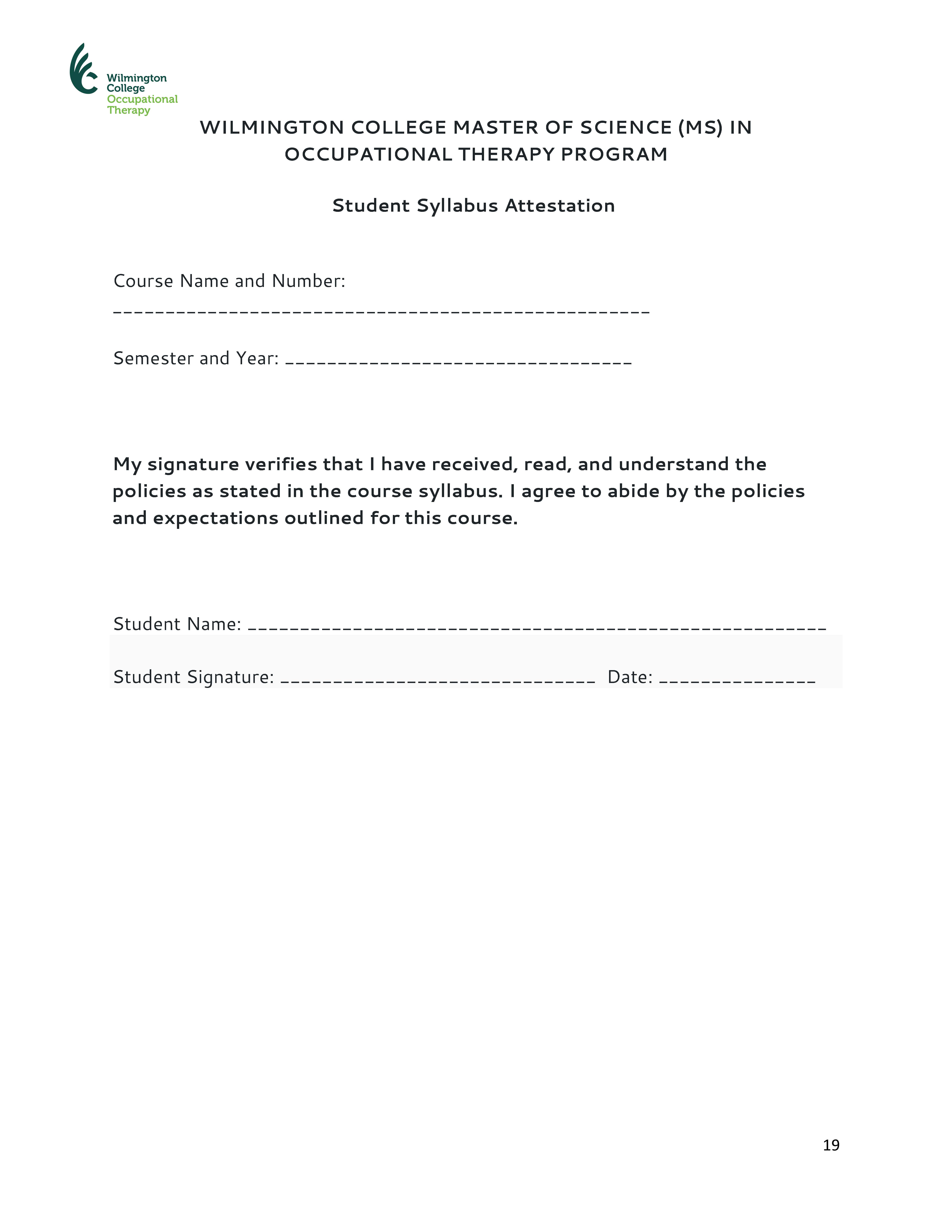
Institutional and Program-Level Policies
All exams will follow the Final Exam Schedule. Students scheduled to take three or more final examinations on one day may request to arrange their examination schedule, so no more than two exams occur on one day.
Requests for early or late exams are considered only under extreme circumstances. Prior to the exam period, the student must file a written request on the Early/Late Exam Form available in the Student One Stop Center, Academic Records, and on the WC portal. The form must be signed by the Instructor and the Academic Dean, approving the alternate exam time. This process must be completed prior to the scheduled exam period.
Out-of-class Work Expectation A minimum of 2 hours of out-of-class student work is expected for each hour of in-class time for traditional face-to-face courses. For online and hybrid courses, the combination of face-to-face time and out-of-class work should be equal to 3 hours per credit hour per week. |
Instructional Course Delivery |
Academic Integrity Policy The use of generative AI is prohibited except where expressly allowed in assignment instructions. |
Academic Misconduct - Examples [10/24]
ACADEMIC CODE OF CONDUCT
This policy is directly related to the first Testimony, which is part of the Student Code of Conduct. “I will practice personal and academic integrity.” The initial responsibility for dealing with academic misconduct lies with the individual faculty member in whose classroom or course of study the offense occurs. The responsibility includes determination of the consequences for the offense. The goal is for faculty to confront cheating and plagiarism, to teach ethical behavior, and to provide an appropriate consequence based on the nature of the incident. Faculty are encouraged to explicitly address academic misconduct and its consequences in the course syllabus.
EXAMPLES OF ACADEMIC MISCONDUCT
A. Examination offenses include, but are not limited to, the following:
1.Taking unauthorized materials into or out of the examination room.
2.Leaving the examination room without authorization before completing an examination.
3.Talking in the examination room without authorization.
4.Discussing the examination outside the examination room during the course of the examination.
5.Attempting to observe the work of another student.
6.Taking an examination for another person or permitting someone else to do so.
7.Collaborating improperly by discussion, joint research, or joint effort in any way expressly prohibited by the instructor. This includes using a cell phone or other device to access information from another source or another student.
8.Improper knowledge of contents of an examination - No student shall knowingly acquire unauthorized knowledge of an examination or any part of an examination, or solicit, offer, or give information about any part of an examination.
B. Student work offenses include, but are not limited to, the following, which are expressly prohibited in the absence of prior written approval of the instructor or instructors involved:
1.Resubmission of work - Submitting work which has been previously submitted for credit.
2. Plagiarism - Submitting work done wholly or partly by another, including the unattributed copying of all or parts of a published work or internet document. Using generative Artificial Intelligence (AI) sources to produce work (when not expressly permitted) is also a form of plagiarism. Some instances of plagiarism are the result of ignorance rather than dishonesty. When plagiarism is encountered, the instructor should be sure that the student knows proper procedures for attributing content.
3.Prohibited sources - Consulting material or persons contrary to the directions of the instructor.
4.Improper collaboration - Engaging in any discussion, joint research, or joint effort of any kind expressly prohibited by the instructor.
5.Deception - Misrepresenting the authenticity of sources, citations, or principles in any written work.
6. Sharing work – Students who share their work with others are responsible for how that work is used. For example, if a student shares a paper with another student to help him or her understand an assignment, and that student submits the work as their own, the author of the paper shares responsibility for the plagiarism committed by the other student.
D. Other misconduct - Engaging in any other improper conduct as specified by the instructor.
E. Lying – deliberately providing false information relevant to academic matters, such as misrepresenting the inability to take an examination because of illness.
F. Disruptive or disrespectful classroom behavior – causing a disturbance in the classroom, interrupting instruction, speaking rudely or threatening students or faculty.
Class Attendance Policy |
ADA (Americans with Disabilities Act)
Students with Disabilities
In accordance with ADA (Americans with Disabilities Act Amendments Act of 2008 (ADA), Section 504 of the Rehabilitation Act of 1973), Wilmington College provides access through reasonable accommodations to students with documented physical and psychological disabilities.
Students who wish to access Services need to meet with the Director of Accessibility and Disability Services and provide verification of their disability. To register with Accessibility and Disability Services, students submit an Application for Services. In addition, the student must provide the Disability Verification form accompanied by current disability documentation from a licensed professional. For more information, contact the Director of Accessibility and Disability Services at accessibility@wilmington.edu or 937.481.2444, 114 Robinson Communcation Center.
